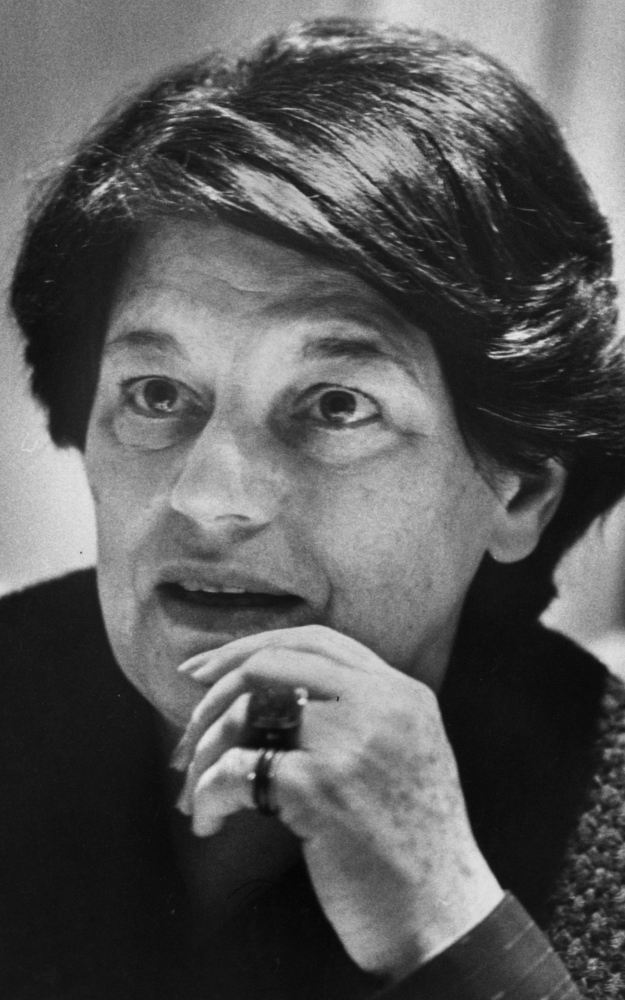TORONTO — Mavis Gallant, the Montreal-born writer who carved out an international reputation as a master short-story author while living in Paris for decades, died Tuesday at age 91, her publisher said.
The bilingual Quebecoise started out as a journalist and went on to publish well over 100 short stories in her lauded career, many of them in The New Yorker magazine and in collections such as “The Other Paris, “Across the Bridge” and “In Transit.”
Random House in Canada confirmed the death, saying she died in her Paris apartment Tuesday morning.
American author Joyce Carol Oates compared Gallant to another Canadian short-story master, Alice Munro, who captured the 2013 Nobel Prize for literature.
“Mavis Gallant enormous influence on Alice Munro,” Oates wrote on Twitter. “Perhaps the Nobel Prize should have been shared at no loss to two great Canadian writers.”
Munro herself said: “Mavis Gallant was a marvelous short-story writer and a constant hopeful influence on my life.”
Gallant’s following in the United States remained small. Many of her books remain out of print, short stories tend not to be bestsellers and as a Canadian living in Paris she often wrote about foreign cultures.
Another Canadian literary luminary, Margaret Atwood, tweeted: “Very sad to hear that MavisGallant has died … wonderful, scrappy person, wonderful writer, fascinating life.”
Born Mavis Leslie Young in Montreal in 1922, Gallant was an only child in an English-speaking Protestant family that splintered: Her father died when she was young, and her mother remarried. Starting from age 4, she was dispatched to numerous boarding schools in Canada and the U.S. Many were French-speaking, and she was often the only English speaker.
After graduation, Gallant returned to Montreal and landed an entry-level stint at the National Film Board and then a job as a reporter for the Montreal Standard.
Gallant married Winnipeg musician John Gallant in 1942, but they divorced five years later. In 1950, she kept a promise she had made to herself to quit journalism by age 30 – she was 28. She began traveling Europe, subsisting on her fees from The New Yorker and by giving English lessons.
“I live on bread, wine, and mortadella,” she wrote in her diary while in Madrid in 1952, as published by The New Yorker. “Europe for me is governed by the price of mortadella.”
She gave herself two years to succeed. She did, beginning a 25-year collaboration with her famous New Yorker editor, author William Maxwell.
“Mavis Gallant published a hundred and sixteen stories in the magazine, and her voice was a defining one for New Yorker fiction: clear, sharp, penetrating, often breathtaking in its ability to dissect human emotions, motivations, flaws, and moments of grace,” New Yorker fiction editor Deborah Treisman said in a statement. “She was an observer, a portraitist both of social niceties – no gesture went unnoted – and of the brutality of what can happen in our own minds.”
Though Montreal’s literary scene was thriving at the time, with writers like Mordecai Richler, Gallant told literary magazine The Paris Review in a 1999 interview that she moved to Europe when “Canada in the early ’50s was an intellectual desert.”
“I wanted to live in Paris and write nothing but fiction and be perfectly free,” she said. “I just held my breath and jumped. I didn’t even look to see if there was water in the pool.”
Gallant felt at home in Europe, gaining acceptance as a writer that she felt she never would have back in Canada, she told a 2006 Bravo! television documentary, “Paris Stories: The Writing of Mavis Gallant.”
“I found for the first time in my life a society where you could say you’re a writer and not be asked for three months’ rent in advance,” she said.
Gallant didn’t often write about herself, but she wrote often of people who, like her, lived in exile. Some of her early life is revealed in a series of stories in the collection “Home Truths.”
Gallant wrote only two novels, “Green Water, Green Sky” and “A Fairly Good Time,” as well as the play “What is to be Done?”
Gallant told The Paris Review that writing is like “a love affair: The beginning is the best part.”
Copy the Story LinkSend questions/comments to the editors.



Success. Please wait for the page to reload. If the page does not reload within 5 seconds, please refresh the page.
Enter your email and password to access comments.
Hi, to comment on stories you must . This profile is in addition to your subscription and website login.
Already have a commenting profile? .
Invalid username/password.
Please check your email to confirm and complete your registration.
Only subscribers are eligible to post comments. Please subscribe or login first for digital access. Here’s why.
Use the form below to reset your password. When you've submitted your account email, we will send an email with a reset code.